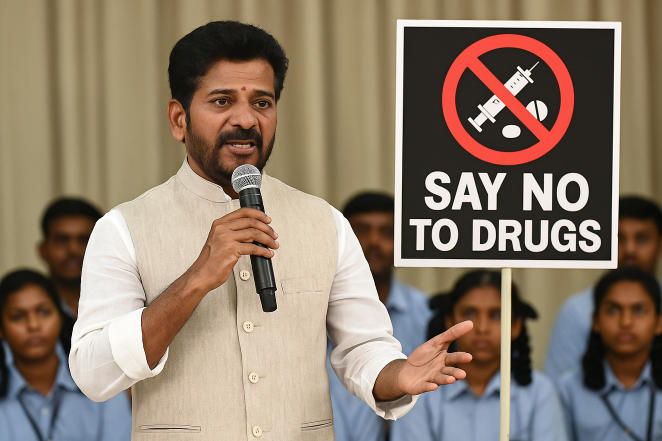In a strong and unprecedented move, Telangana Chief Minister Revanth Reddy has issued a clear warning to educational institutions across the state: they will now be held legally accountable if students are caught engaging in drug abuse on campus. This announcement, made on June 27, 2025, marks a decisive shift in state policy aimed at tackling the rising drug menace among the youth.
During a press briefing in Hyderabad, CM Revanth Reddy stated that schools, colleges, and coaching centers cannot escape responsibility if their premises become breeding grounds for substance abuse. Institutions may even be named as co-accused in criminal proceedings if adequate preventive measures are not in place.
🔍 A Wake-Up Call to the Education Sector
The Chief Minister’s announcement follows a growing number of reports on drug usage among students, particularly in urban areas such as Hyderabad, Warangal, and Nizamabad. Parents, social workers, and law enforcement officials have voiced deep concerns about how illicit substances are being distributed near or even within educational campuses.
“It is no longer enough for schools to claim ignorance,” said Revanth Reddy. “If students are found under the influence or in possession of drugs on school grounds, the institution will be answerable before the law.”
The announcement was met with mixed reactions. While some educators applauded the move as a necessary step to ensure student safety, others feared the legal burden could overwhelm under-resourced institutions, especially in rural Telangana.
🧑⚖️ Legal Liability for Negligence
As per the statement, the state government is considering amendments to existing laws that will place legal duties on educational administrators to report suspected drug activity. Institutions that fail to act—or those found to have ignored warning signs—could face penalties, suspensions, or criminal charges.
An official from the Telangana Legal Services Authority noted, “A provision is being drafted to define institutional accountability. Schools and colleges must now function as guardians of legal and moral order, not just education.”
This policy was inspired by recent legal models in Europe and North America, where institutions can be penalized for failing to provide safe environments for their students.
🏫 Implementation Through Strict Monitoring
To ensure that the policy is implemented effectively, the Telangana government is preparing to launch a state-wide School Monitoring Taskforce by August 2025. The task force will:
- Conduct surprise inspections at schools and colleges
- Train teachers and staff in recognizing signs of drug abuse
- Coordinate with local police for immediate action
- Maintain records of recurring incidents for administrative review
Educational boards will be asked to update institutional guidelines and safety protocols within the next 60 days.
In addition, helplines and anonymous reporting tools will be introduced for students and faculty to report suspicious behavior.
🧠 Preventive Education and Awareness Programs
While the focus is on enforcement, CM Revanth Reddy also emphasized the importance of preventive education. Schools will be required to conduct monthly awareness sessions involving:
- Drug addiction survivors
- Healthcare professionals
- Police officials and psychologists
- Parental awareness groups
A portion of the school development funds will be earmarked for counseling and mental health services, ensuring that students get the support they need before turning to substances.
📊 Rising Drug Use Among Students: A Snapshot
According to the Telangana State Anti-Narcotics Bureau, at least 1,900 drug-related cases involving youth under the age of 22 were registered in 2024. Hyderabad alone accounted for over 40% of these, followed by Warangal and Karimnagar.
Surveys conducted by NGOs revealed that peer pressure, academic stress, and easy availability were the top three factors influencing drug use among school and college students.
The problem is not unique to Telangana, but the state’s firm policy shift sets it apart from many others that continue to treat campus drug abuse as an isolated problem.
💬 Mixed Reactions from the Public
Parents’ associations across Telangana welcomed the Chief Minister’s bold stand. “It’s high time someone took institutions to task. We send our children to learn, not to fall into addiction,” said Meenakshi Verma, a parent from Nalgonda.
On the other hand, the Telangana Private Schools Association urged the government to provide more support than punishment. “Many schools are unaware of such activities unless caught red-handed. We need tools and training, not just threats,” a spokesperson said.
📌 Last Thoughts
With his latest declaration, CM Revanth Reddy has made it clear: schools and colleges are not above the law when it comes to the welfare of students. The message is simple—you educate them, you protect them.
This directive is expected to bring sweeping changes across Telangana’s educational landscape. While some institutions may struggle to adapt, the long-term goal is a drug-free academic environment where students can focus on learning and growth without falling prey to dangerous substances.
The coming weeks will show how this landmark policy is received, enforced, and perhaps replicated in other states seeking to curb the drug crisis among youth.

